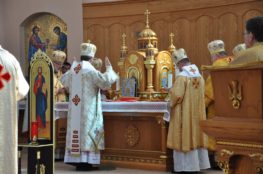The news isn’t new, but since so few Catholic and Orthodox web-logs are mentioning it, I thought I might take a few moments to remind readers that Russia is continuing to persecute both Christians and non-Christians in the recently annexed Crimea. It appears that both the Ukrainian Greek Catholic Church (UGCC) and Orthodox Christians loyal to the Kievan Patriarch (as opposed to the Moscow Patriarch (MP)) are high on the target list. More details on what is going on over there are available from Eurasia Review.
None of this is surprising really, though I can already hear the tepid defense of some Orthodox, “It could be worse!” Sure. It could be like 1946 all over again when UGCC clergy were gunned down in the street and the faithful were sent to labor camps. Not that Russia or the MP are falling over themselves to acknowledge that travesty, let alone apologize for it. As I discussed briefly before, the MP’s public face in the West, Metropolitan Hilarion Alfeyev, has been waging a persistent propaganda war against the UGCC, blaming it for the crisis in Ukraine while lamenting the loss of Russian church properties which occurred centuries ago. At no time during this conflict has any evidence emerged that the Russian Orthodox Church is prepared to rise above its political ties in order to press for peace in the region. Some argue they shouldn’t have to. Perhaps more than any other extant Orthodox jurisdiction, the MP shows no shame in being tethered to ethno-nationalist worldview which divides the world neatly between Russians and non-Russians. Even in America one finds Orthodox — some of them ex-Protestant converts — basking in the glory of “Neo-Holy Russia” and her principled stand against the debauchery of the West and the rotten heresies of the Roman Church. It’s a sad, but predictable, spectacle.
In stating this, let me be clear that it would be a mistake to hold every Orthodox leader, Russian or otherwise, responsible for what is taking place in Ukraine right now. The problem, however, is that those in the Russian Church who set the marching orders have not rescinded their invective against the UGCC. If anything, they have tried to drive a wedge between Roman Catholics and Ukrainian Catholics by claiming — falsely — that the actions of the latter hurt ties with the former; there seems to be little understanding among certain Orthodox hierarchs that Rome and the UGCC are one Church. At a far lower level, it is depressing to see Catholics, particularly traditional Catholics, laud Vladimir Putin and the MP as great champions of Christianity when they endorse policies that are manifestly anti-Catholic. As a recently Telegraph article discussed, it’s never been easy being Russian and Catholic — and it still isn’t. (Sadly, part of the blame for that lies with the Vatican.)



